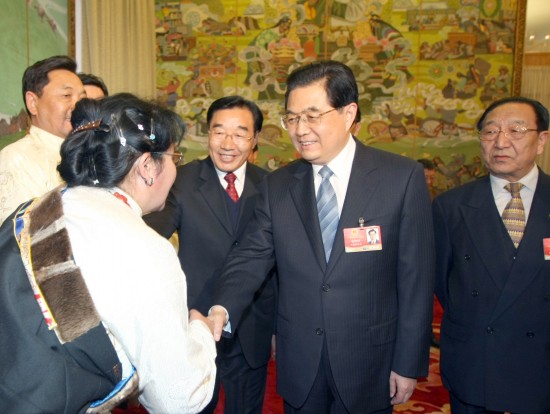 |
|
President Hu Jintao (2nd R) joins a panel discussion with deputies to the Second Session of the 11th National People's Congress (NPC) from southwest China's Tibet Autonomous Region, in Beijing, capital of China, March 9, 2009.
|
Chinese President Hu Jintao called for the building of a Great Wall of stability in Tibet on Monday, prior to the 50th anniversary of the foiling of an armed rebellion led by the Dalai Lama's supporters.
Hu stressed the necessity to promote development and stability in Tibet when joining a panel discussion with deputies of the National People's Congress (NPC) from the Tibet Autonomous Region.
"We must reinforce the solid Great Wall for combating separatism and safeguarding national unity, so that Tibet, now basically stable, will enjoy lasting peace and stability," said Hu.
He urged Tibet authorities to implement the central government's policies on Tibet, focus on development and stability issues, attain an economic great-leap-forward, safeguard "national security" and "social stability", and keep improving people's living standard, in order for them to make new progress in the building of "a unified, democratic, prosperous and harmonious socialistic new Tibet."
In pursuing economic development, Hu said, Tibet must stick to the development road with Chinese characteristics and Tibetan features so as to strengthen the material foundation for the building of socialistic new Tibet.
The President urges Tibet to vigorously advance the program of building "socialist new villages," develop industries with distinguished features" and strengthen ecological and environmental protection.
Hu expressed the hope that Tibet should embark on more projects that will directly result in the improvement of people's life and working conditions, particularly those of farmers and herdsmen.
The government must also give priority to addressing people's immediate needs, so that people of all ethnic groups in Tibet will be able to share the fruit of development, he said.